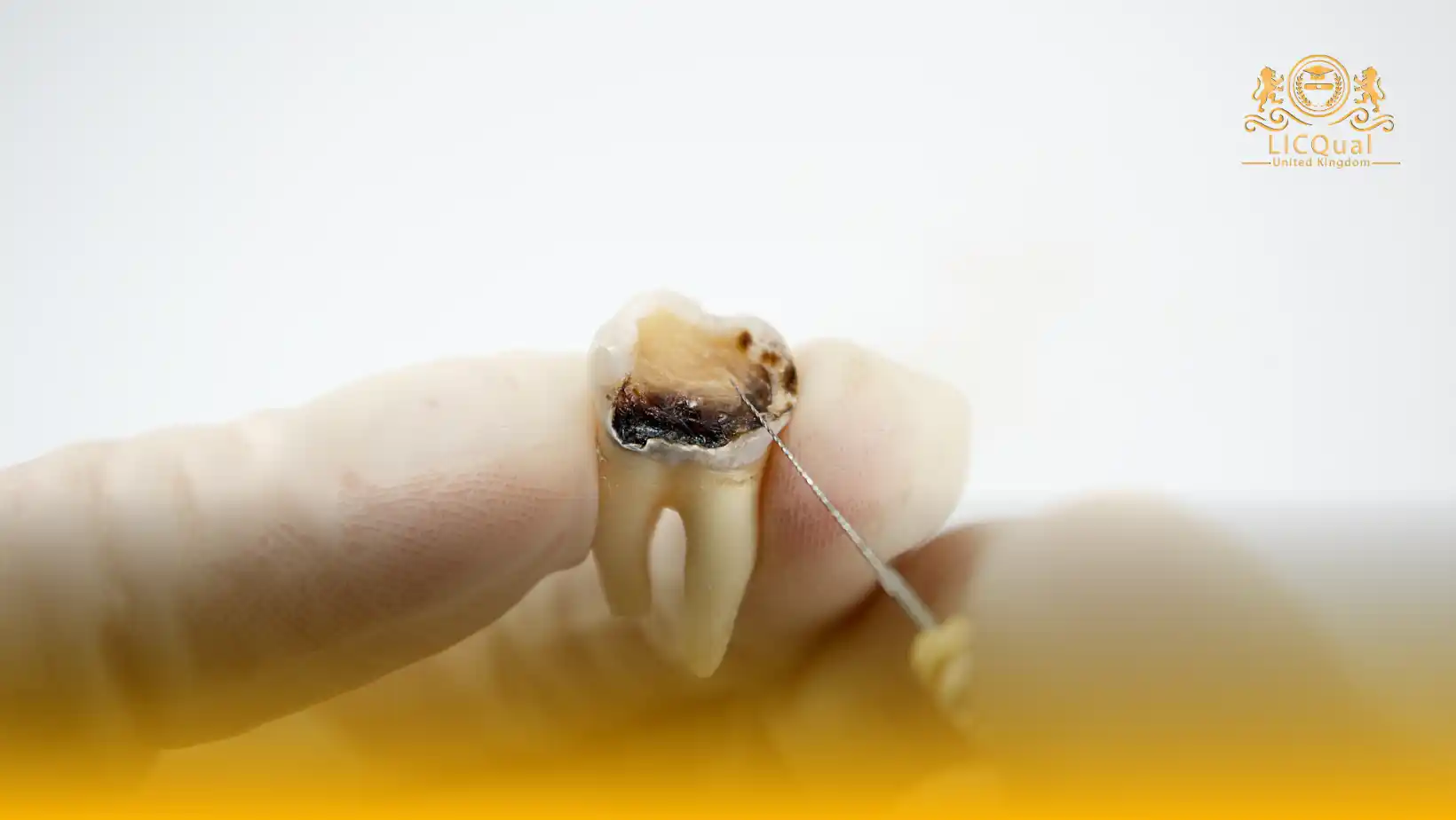The LICQual Level 3 Diploma in Endodontics is a specialised qualification designed for dental professionals seeking to enhance their expertise in endodontic treatments and root canal therapy. This diploma is not intended for beginners but is specifically tailored for experienced practitioners who wish to advance their career prospects, expand their clinical knowledge, and fulfil their Continuing Professional Development (CPD) requirements.
Learners undertaking this qualification will gain in-depth understanding of endodontic principles, including diagnosis, treatment planning, and the management of complex cases. The programme combines theoretical knowledge with practical application, ensuring learners develop the skills necessary to perform endodontic procedures confidently and safely.
Centres delivering the LICQual Level 3 Diploma in Endodontics are required to uphold the highest standards of training. This includes employing competent and qualified staff, providing access to modern endodontic materials and equipment, and maintaining facilities that support effective learning and skills development. By ensuring these standards, centres help learners achieve their full potential and succeed in advanced endodontic practice.
Upon completion, learners will be equipped to demonstrate professional excellence, manage complex endodontic cases effectively, and enhance their clinical capabilities. This qualification is ideal for dentists, endodontic specialists, and allied dental professionals committed to advancing their expertise and delivering exceptional patient care in the field of endodontics.
Course Overview
Qualification Title
LICQual Level 3 Diploma in Endodontics
Total Units
6
Total Credits
60
GLH
240
Qualification #
LICQ2200656
Qualification Specification
To enroll in the LICQual Level 3 Diploma in Endodontics, applicants must meet the following criteria:
|
Qualification# |
Unit Title |
Credits |
GLH |
|---|---|---|---|
|
LICQ2200656-1 |
Principles of Endodontics |
10 |
40 |
|
LICQ2200656-2 |
Diagnosis and Treatment Planning |
10 |
40 |
|
LICQ2200656-3 |
Root Canal Preparation and Instrumentation |
10 |
40 |
|
LICQ2200656-4 |
Root Canal Obturation and Restoration |
10 |
40 |
|
LICQ2200656-5 |
Management of Complex Cases and Complications |
10 |
40 |
|
LICQ2200656-6 |
Clinical Case Management and Patient Care |
10 |
40 |
By the end of this course, learners will be able to:
Unit 1: Principles of Endodontics
By the end of this unit, learners will be able to:
- Explain the fundamental principles and concepts of endodontics.
- Identify dental anatomy relevant to root canal treatments.
- Describe the biological and pathological processes affecting the pulp and periapical tissues.
- Apply knowledge of endodontic terminology in clinical practice.
Unit 2: Diagnosis and Treatment Planning
By the end of this unit, learners will be able to:
- Assess patients’ oral health and endodontic needs effectively.
- Use diagnostic tools and techniques, including radiographs and pulp testing.
- Develop comprehensive and evidence-based endodontic treatment plans.
- Communicate treatment options and recommendations clearly to patients.
Unit 3: Root Canal Preparation and Instrumentation
By the end of this unit, learners will be able to:
- Demonstrate manual and rotary techniques for cleaning and shaping root canals.
- Select appropriate instruments and materials for root canal preparation.
- Apply infection control and safety protocols during endodontic procedures.
- Identify and manage common procedural difficulties during instrumentation.
Unit 4: Root Canal Obturation and Restoration
By the end of this unit, learners will be able to:
- Demonstrate effective root canal obturation techniques.
- Select suitable materials for obturation and post-endodontic restoration.
- Restore endodontically treated teeth to ensure function and aesthetics.
- Evaluate the quality and success of completed endodontic treatments.
Unit 5: Management of Complex Cases and Complications
By the end of this unit, learners will be able to:
- Identify complex endodontic cases and retreatment scenarios.
- Apply strategies for managing procedural complications.
- Evaluate treatment outcomes and modify approaches as necessary.
- Understand the ethical and professional considerations in complex endodontic care.
Unit 6: Clinical Case Management and Patient Care
By the end of this unit, learners will be able to:
- Manage endodontic patients safely and professionally.
- Integrate theoretical knowledge with practical skills in clinical practice.
- Assess and evaluate treatment outcomes to ensure high-quality patient care.
- Demonstrate effective communication and patient management skills.
The LICQual Level 3 Diploma in Endodontics is designed for dental professionals seeking advanced expertise in root canal therapy, pulp treatment, and endodontic procedures. This course is ideal for dentists, endodontists, and allied dental staff who want to enhance patient care, manage complex cases, and earn internationally recognized certification.
1. General Dentists and Practitioners
- Dentists aiming to expand their skills in root canal therapy.
- Professionals seeking advanced endodontic training.
- Clinicians interested in internationally recognized certification.
- Dentists improving patient outcomes through precise endodontic care.
- Practitioners mastering evidence-based endodontic techniques.
2. Endodontists and Specialists
- Specialists managing complex dental pulp and root canal cases.
- Professionals enhancing hands-on clinical expertise.
- Experts learning modern instrumentation and obturation techniques.
- Clinicians focused on effective management of periapical infections.
- Endodontists staying updated with advanced materials and methods.
3. Dental Hygienists and Assistants
- Hygienists assisting with endodontic procedures efficiently.
- Assistants improving workflow in root canal and pulp treatments.
- Staff learning patient preparation and post-procedure care.
- Team members ensuring patient comfort and procedural safety.
- Professionals pursuing certification to enhance career opportunities.
4. Dental Students and Graduates
- Recent graduates preparing for specialized careers in endodontics.
- Students seeking hands-on experience with root canal treatments.
- Learners aiming for internationally recognized credentials.
- Individuals building foundational skills in pulp and root management.
- Aspiring dental professionals focused on comprehensive patient care.
5. Academic and Research Professionals
- Educators incorporating endodontics into dental curricula.
- Researchers studying pulp therapy and treatment outcomes.
- Academics developing evidence-based endodontic protocols.
- Professionals conducting clinical studies on complex cases.
- Instructors providing practical training in root canal techniques.
6. Multidisciplinary Dental Teams
- Medical and dental staff collaborating on complex cases.
- Professionals integrating endodontic care into broader treatment plans.
- Team members ensuring safe and effective patient management.
- Staff focusing on workflow efficiency and communication.
- Practitioners optimizing coordination in clinical endodontics.
7. Career-Focused Dental Professionals
- Individuals aiming to enhance clinical and procedural skills.
- Professionals pursuing globally recognized endodontic certification.
- Dentists expanding practice offerings with advanced root canal care.
- Learners enhancing professional credibility and reputation.
- Dental professionals committed to excellence in patient outcomes and endodontic care.
This course equips a wide range of dental professionals with advanced expertise in endodontics, enabling them to provide high-quality patient care while advancing their careers.
To deliver the LICQual Level 3 Diploma in Endodontics effectively, centres must meet the following requirements to ensure high-quality training and learner success:
- Qualified and Competent Staff: Centres must employ experienced dental educators and clinicians with recognised qualifications in endodontics or related dental fields. Staff should be skilled in both theoretical instruction and practical training.
- Adequate Facilities: Centres should provide suitable clinical environments, including treatment rooms and laboratories that meet health and safety standards for endodontic procedures.
- Access to Endodontic Materials and Equipment: Centres must supply all necessary materials, instruments, and tools required for practical training, including root canal instruments, obturation materials, and diagnostic tools.
- Learning Resources: Centres should provide learners with up-to-date textbooks, digital resources, and reference materials to support both theoretical and practical learning.
- Health and Safety Compliance: Centres must comply with all relevant dental health and safety regulations, infection control standards, and professional guidelines.
- Assessment and Learner Support: Centres must have systems in place for continuous assessment, feedback, and guidance to support learners in achieving course outcomes successfully.
- Commitment to Quality: Centres should maintain high standards of teaching, monitoring, and quality assurance to provide an effective and professional learning experience.
Meeting these centre requirements ensures learners receive comprehensive, safe, and practical training, equipping them with the skills and confidence to excel in endodontics.
Assessment and Verification
All units within this qualification are subject to internal assessment by the approved centre and external verification by LICQual. The qualification follows a criterion-referenced assessment approach, ensuring that learners meet all specified learning outcomes.
To achieve a ‘Pass’ in any unit, learners must provide valid, sufficient, and authentic evidence demonstrating their attainment of all learning outcomes and compliance with the prescribed assessment criteria. The Assessor is responsible for evaluating the evidence and determining whether the learner has successfully met the required standards.
Assessors must maintain a clear and comprehensive audit trail, documenting the basis for their assessment decisions to ensure transparency, consistency, and compliance with quality assurance requirements.







